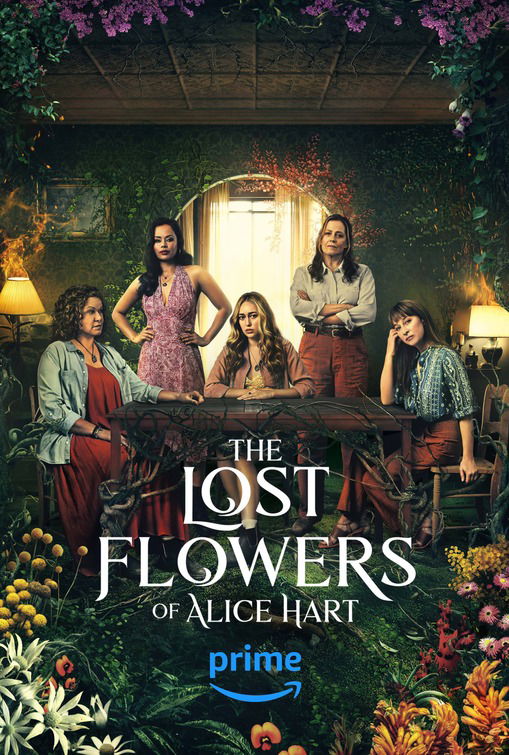“Intense Family Drama Marred by Romantic, Feminist Perspective”

| None | Light | Moderate | Heavy | |
|---|---|---|---|---|
| Language | ||||
| Violence | ||||
| Sex | ||||
| Nudity |
What You Need To Know:
Based on a novel, THE LOST FLOWERS OF ALICE HART has many dramatically powerful scenes. The acting and production values are excellent. However, the program uses too many flashbacks. It also offers mostly secular and emotional Romantic, feminist solutions to the problem of men committing acts of physical abuse in and outside the home. Finally, THE LOST FLOWERS OF ALICE HART has lots of strong foul language, some scenes of fornication, a reference to incest, a lesbian subplot for the title character’s grandmother, some drunkenness, and brief marijuana use.
Content:
Strong Romantic, politically correct, feminist worldview and perspective on domestic abuse and violence of men against women and children, with a major subplot about a girl’s grandmother and the grandmother’s long-time lesbian partner, mitigated by some moral, redemptive elements, offers only emotional Romantic, feminist solutions to the problem of men committing acts of physical abuse and rape (including a case of incest) in and outside the home
At least 54 obscenities (mostly “f” words), two Jesus profanities, multiple light profanities, one euphemistic reference to self-abuse, and a man uses the words “slutty” and “whore” to refer to sexual promiscuity
frequent scenes of male-on-female domestic abuse, male character habitually beats his wife and young daughter, girl has visions of setting her abusive father on fire, girl hits a bully repeatedly in the face with a book, two children slice their hands to make a pact, a verbal reference to a woman being gang-raped, two women get into a brief physical altercation, young man starts to strangle his mother after she brings up his past rape of his younger sister (he threatens to kill her if she tells the woman he’s marrying), and a man starts to strangle his young daughter, but woman beats him to death with a large stick to defend her
An unmarried and troubled young woman sleeps with two men, there are v erbal references in one scene to a young man having raped his younger sister in the past, two older women are in a long-term lesbian
Rear male nudity in one scene, a woman removes her underwear while fully clothed and instances of upper male nudity
A woman twice drinks heavily to excess, characters drink socially at bars and nightclubs
Some characters smoke cigarettes and/or marijuana; and,
Characters frequently use manipulation and deception to get what they want, to the detriment of their loved ones, and an abusive boyfriend spreads false rumors about his girlfriend to deflect her accusations of violence against him.
More Detail:
Based on a novel by Holly Ringland, THE LOST FLOWERS OF ALICE HART tells a sociopolitical dramatic story about domestic abuse and dysfunctional family issues. Ultimately, however, it focuses on the prevalence of violent behavior of men against women. As a result, the story weaves a tale about domestic abuse and rape, and its consequences for one family in rural Australia.
Almost every frame in THE LOST FLOWERS OF ALICE HART feels like it was crafted to be the most important image in the program . The level of care put into every detail of LOST FLOWERS is evident. The movie’s bewitching cinematography is reminiscent of a Terrence Malick or Zack Snyder movie. LOST FLOWERS also has impressive sound design and editing, and what is arguably a career-best performance from Sigourney Weaver. Finally, the complex plot peels back layers with the perfect timing, not so fast as to kill the narrative tension, but not so slow as to make the viewer lose interest. However, the program too often reveals crucial information for viewers in flashback. For example, a flashback reveals that, as a teenager, Alice had developed a romantic relationship with a childhood friend who is, along with his mother, an illegal alien from Bulgaria. Alice and the boy agreed to marry one another when they reached 18. Several scenes later, another flashback, mixed with scenes in the present day, reveals that June, Alice’s grandmother, connived to get the boy deported back to Bulgaria because she didn’t want Alice to run away with him to Bulgaria. For five years, the boy wrote to Alice, but June hid the letters from her. Alice finds out about everything when she finally sees a letter from the boy, who writes that he wrote to her for five years and didn’t get a reply. In the new letter, he tells Alice he’s met another girl, and they’re going to get married. Alice is devastated by this new information. Angrily, she leaves the flower farm, intending never to return. The movie also reveals that June’s lesbian partner, Trig, went along with June’s plan regarding the boy and Alice. However, when Trig also learns later that June kept another important family secret from both her and Alice, she also decides to leave the farm and look for Alice. Although these flashbacks, as they play out, lead to some powerful dramatic scenes, they can be frustrating to viewers, especially those who prefer a more straightforward plot structure.
Sadly, THE LOST FLOWERS OF ALICE HART tells its story of men physically abusing girls and women from a Romantic, politically correct, feminist perspective. For example, it offers mostly secular, emotional Romantic, feminist solutions to the problem of men committing acts of physical abuse and rape (including a past case of incest) in and outside the home. No religious solutions are offered, much less any Christian or biblical ones. The characters in LOST FLOWERS, including the two evil male villains in the story, have no religious, spiritual background, and no traditional moral philosophies or guidelines by which to live. The program does have some touching scenes of family reconciliation, however. Also, it suggests at one point that men who physically abuse women and children may have other traits that are positive, such as an ability to act heroically in some situations.
THE LOST FLOWERS OF ALICE HART also has repeated depictions of physical domestic abuse. It also has lots of strong foul language throughout the seven episodes, plus some scenes of fornication, a verbal reference to incest, a lesbian subplot for the title character’s grandmother, some drunkenness by the title character, and brief marijuana use.
Women are three times more likely to be physically abused by a husband or boyfriend than men by a wife or girlfriend. Also, in Australia nearly 2.1 million women and men witnessed violence towards their mother by a partner, and nearly 820,000 witnessed violence towards their father, before the age of 15. So, violently abusive men are indeed a major social problem. However, if we really want to make a dent in this problem, feely-touchy solutions will not really help. In fact, they ironically just promote the stereotype of women as victims of mean, evil men who are not held accountable by society at large. LOST FLOWERS does, however, promote the idea that women must speak out loudly to the authorities whenever they suffer physical abuse.


 - Content:
- Content: 

